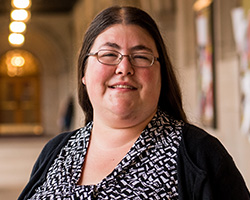A new way to deliver vaccines to the elderly without inflammation
Jai Rudra, Meredith Jackrel to use nanofibers to develop new vaccines

The SARS-CoV2 pandemic has emphasized the importance for vaccines, particularly for the elderly, who have been disproportionally impacted by the virus. However, a decline in immune response as well as inflammation accompany aging and requires an immune booster to improve the immune response.
Jai Rudra, assistant professor of biomedical engineering in the McKelvey School of Engineering, will collaborate with Meredith Jackrel, assistant professor of chemistry in Arts & Sciences, both at Washington University in St. Louis, in a plan to develop and test a novel nanofiber material to eliminate the use of adjuvants with a two-year, $433,125 grant from the National Institutes of Health. The award funds high-risk, exploratory research for the early and conceptual stages of developing a project.
Rudra proposes to test amyloid-like peptide nanofibers as materials to develop novel vaccines that do not require adjuvants. These peptide nanofibers do not require added adjuvants and are expected to trigger the autophagy pathway, a kind of cellular recycling that can also promote good immunological functions, which has emerged as a potential vaccine target. Using these peptide nanofibers leads to strong antibody responses without local reactions, making them attractive to deliver vaccines to the elderly. However, because of their similarity to amyloids that accumulate in patients with neurodegenerative diseases, such as Alzheimer’s, Huntington’s and Parkinson’s, it is essential that the researchers thoroughly test the safety and clearance mechanism of the peptide nanofiber vaccines.
Jackrel’s lab focuses on developing model systems to study the toxicity and mechanism of disease-associated amyloid proteins. The two labs have already worked together to confirm that these peptide nanofibers are not toxic and have made some new insights into their mechanism of clearance. With early work near completion, Rudra’s lab has begun work in animal systems. Once toxicity testing is completed, work will begin on testing conjugates to various vaccine targets, notably those that underpin SARS CoV-2.





